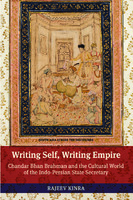Writing Self, Writing Empire: Chandar Bhan Brahman and the Cultural World of the Indo-Persian State Secretary
Abstract
"Writing Self, Writing Empire examines the life, career, and writings of the Mughal state secretary, or munshi, Chandar Bhan Brahman (d. ca. 1670), one of the great Indo-Persian poets and prose stylists of early modern South Asia. Chandar Bhan’s life spanned the reigns of four emperors: Akbar (1556–1605), Jahangir (1605–1627), Shah Jahan (1628–1658), and Aurangzeb ‘Alamgir (1658–1707), the last of the “Great Mughals” whose courts dominated the culture and politics of the subcontinent at the height of the empire’s power, territorial reach, and global influence. Chandar Bhan was a high-caste Hindu who worked for a series of Muslim monarchs and other officials, forming powerful friendships along the way; his experience bears vivid testimony to the pluralistic atmosphere of the Mughal court, particularly during the reign of Shah Jahan, the celebrated builder of the Taj Mahal. But his widely circulated and emulated works also touch on a range of topics central to our understanding of the court’s literary, mystical, administrative, and ethical cultures, while his letters and autobiographical writings provide tantalizing examples of early modern Indo-Persian modes of self-fashioning. Chandar Bhan’s oeuvre is a valuable window onto a crucial, though surprisingly neglected, period of Mughal cultural and political history."
Keywords
munshi; indo-persian literature; chandar bhan brahman; mughal empire; Aurangzeb; Hinduism; India; Shah JahanDOI
10.1525/luminos.3ISBN
9780520961685OCN
923818582Publisher
University of California PressPublisher website
https://www.ucpress.edu/Publication date and place
Oakland, California, 2015Series
South Asia Across the Disciplines,Classification
Biography: general
Literary theory


 Download
Download Web Shop
Web Shop